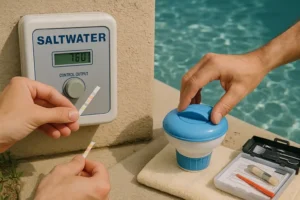If you live in Texas and are weighing your options for a new or upgraded backyard oasis, you’ve likely found yourself comparing chlorinated vs. saltwater pools in Texas. It’s one of those homeowner debates that never quite ends—like gas vs. electric grills or real grass vs. turf. But when you’re living under a sky that rarely gives shade and summer feels like it lasts 10 months, making the right choice can save you more than just money.
 Understanding the Basics: What’s the Real Difference?
Understanding the Basics: What’s the Real Difference?
The first time I dipped into a saltwater pool, I thought I had stumbled into a hidden spa. The water was soft, almost silky—none of that sting you get with high chlorine levels, and no heavy chemical smell clinging to your skin after a swim. That day changed my perception completely. But is that enough reason to switch?
Let’s break it down.
A chlorinated pool relies on regular additions of liquid or tablet chlorine to sanitize the water. It’s straightforward, easy to manage, and often cheaper upfront. However, the constant chemical balancing act can wear on you—especially when pool maintenance becomes a twice-weekly chore thanks to dust storms and record-breaking heat in Texas.
On the flip side, a saltwater system uses a generator to convert salt into chlorine gradually and continuously. That means no manual dosing, less chance of over-chlorination, and water that feels gentler on the skin. Still, the upfront investment can be high, and the system isn’t exactly maintenance-free.
How Does Texas Climate Tip the Scale?
Now, throw the Texas climate into this mix. We’re talking triple-digit heat for weeks, heavy pollen in spring, sudden summer downpours, and dust that finds its way into every crack and crevice. It’s no exaggeration when I say that your pool maintenance routine has to work harder here.
In high heat, chlorine levels in traditional pools evaporate faster. If you’ve ever opened your pool cover and found the water cloudy even though you “just shocked it last week,” then you know what I mean. Saltwater systems handle this better, thanks to the slow, steady generation of chlorine. They also tend to stabilize the pH better, making your weekly testing a bit more predictable.
But be warned—Texas heat can also strain your salt cell if not properly monitored. So don’t fall into the trap of thinking “set it and forget it.” It still requires you to stay engaged.
Saltwater Systems in the Texas Heat: Natural Chemistry at Work
When people hear “saltwater,” they often picture the ocean. But saltwater pools are their own kind of magic—and they’re gaining popularity fast, especially in Texas. Why? Because when the sun turns relentless, and you’re sweating just walking from your car to the house, the last thing you want is a harsh chemical sting every time you dip your toe in.
Let’s talk about how saltwater pool systems in Texas can change the game.
Unlike traditional chlorine setups where you dump in chemicals week after week, saltwater systems use electrolysis. The salt, already present in the water, gets converted into chlorine by a salt cell. It’s a gentler, steadier kind of sanitizing—and way less fussy than hauling jugs of chlorine through a blazing driveway.
You’ll feel the difference too. The water? Silky. Softer on the skin, easier on the eyes. And while we can’t promise it’ll cure your allergies, most people swear it feels better on sensitive skin and hair. It’s like taking a spa dip… in your own backyard.
From a maintenance perspective, saltwater does come with its own rhythm. Yes, you still need to test and balance the water (sorry, no skipping that). But you won’t be constantly chasing chlorine levels like you might with traditional setups. Plus, there’s less of that strong “pool smell” lingering in your towels or stinging your nostrils.
Of course, nothing’s perfect. The pool equipment for saltwater systems—like the salt cell and control board—can wear out over time, especially under Texas’ sizzling sun. Replacement costs can add up, and those components are a bit pricier than your average bucket of tablets. You’ll also want to be mindful of corrosion if you have metal fixtures or a stone deck nearby. Salt doesn’t play nice with every surface.
So, is it worth it? For many pool owners here, the answer is yes. The upfront cost may be a hurdle, but the trade-off is fewer chemicals, gentler swims, and a more consistent sanitizing process. That’s a win in our book.
By now, you might be wondering—okay, but how do these two systems stack up side by side?
That’s exactly what we’ll explore in the final section: the head-to-head breakdown of saltwater pool systems in Texas vs. traditional chlorine setups. Let’s dive in.
 Head-to-Head Comparison: Which Pool System Fits Texas Living?
Head-to-Head Comparison: Which Pool System Fits Texas Living?
If you’re still torn between chlorine and saltwater pool systems in Texas, you’re not alone. Most homeowners wrestle with this choice at some point, especially when Texas brings the heat—and the dust, and the unpredictability. So let’s break it down. Not with cold stats or techy jargon, but real-life insight from folks who’ve walked barefoot on hot flagstone after brushing their pools at noon.
Maintenance
Chlorine pools ask for your constant attention. From balancing pH to shocking the water weekly, you’re always monitoring chemical levels. In extreme heat, chlorine breaks down faster, meaning more refills, more testing, more bottles stacked in the garage.
Saltwater pool systems in Texas, on the other hand, offer a smoother ride. While the salt cell does require cleaning and occasional replacement, the day-to-day work feels lighter. The water stays more balanced on its own. Fewer sharp swings. Less guesswork. And once you get the hang of the system, it feels like your pool is almost caring for itself.
Cost
Let’s be real—cost is usually the tiebreaker. Chlorine systems win the short-term battle. They’re cheaper to install, and the chemicals themselves are initially less expensive.
But look past year one, and the story shifts.
With saltwater pool systems in Texas, the setup is pricier. You’ll pay more upfront for the generator and possibly need upgraded materials for salt resistance. However, over the years, you might save on chemicals and enjoy longer periods between major maintenance calls. It’s a long-game investment.
Comfort & Feel
This is where saltwater pools shine brightest. Ask anyone who’s switched, and you’ll hear the same things: “No more itchy skin,” “My hair feels normal again,” “The water just feels… better.”
Saltwater isn’t actually salty like the sea—more like the softness of a gentle mineral bath. On those 104°F days when you just want relief, it makes a world of difference. Chlorine water does its job, no doubt, but it doesn’t exactly whisper “relax.”
Sustainability
A quiet but growing reason many Texans are making the switch? Sustainability. Fewer trips to the store. Fewer plastic containers of chemicals. Less risk of over-chlorination or chemical burns.
Plus, saltwater pool systems in Texas tend to integrate better with eco-conscious pool practices like solar covers and smart pumps. It’s not perfect, but it leans greener than traditional chlorination.
If you’re leaning toward a saltwater system and wondering how to maintain it, don’t miss our in-depth piece on Eco-Friendly Chemistry: Biodegradable Products and Salt Systems for Pools. It’s a great follow-up to keep your water clean and sustainable.
FAQs (Frequently Asked Questions)
1. Are saltwater pools good for hot climates like Texas?
Yes! Saltwater pool systems in Texas thrive in heat because they self-generate chlorine consistently. You avoid chemical spikes and enjoy smoother maintenance, especially during long summers.
2. Is it expensive to convert a chlorine pool to saltwater?
The upfront cost can range from $1,500 to $2,500, but many homeowners find that the salt pool pays off over time with fewer chemical purchases and less manual upkeep.
3. Do saltwater pools taste salty or damage the skin?
Not at all. They contain a fraction of the salt found in the ocean. Most people find salt pool water gentler on the eyes and skin, especially for children and those with sensitivities.
4. Which system is easier to maintain during Texas dust storms?
While both need regular pool maintenance, saltwater pool systems in Texas often stabilize faster after debris or rain due to their automatic chlorine generation.
5. Can salt damage pool equipment or stone?
If your pool wasn’t built for it, yes. Make sure your surfaces and hardware are rated for salt exposure. But most modern saltwater pool systems are compatible with common finishes.
